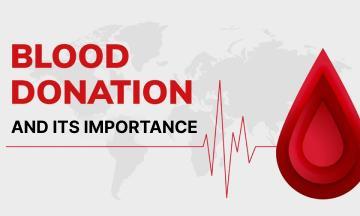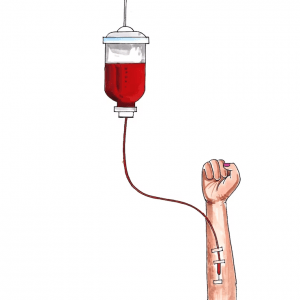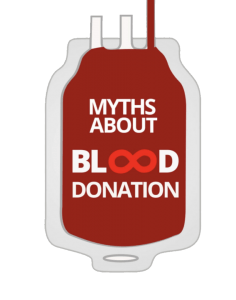Blood donation & its importance

There’s a fundamental aspect of medicine that has so far been irreplaceable with technology: Blood.
Blood is a living tissue with an abundance of live cells that are fundamental blocks of life. The Red Cells in blood help carry gases between the lungs and the rest of the body. White blood cells of which there are several types, fight infection and form a part of the body’s immune system. Platelets are another type of blood cell that helps blood clot and stops bleeding when the body is injured. Plasma is a rich source of clotting factors, proteins, and other protective antibodies that helps transport blood everywhere in the body.
Blood: A Necessity
Every moment, someone needs blood. Blood is needed by children who suffer from blood disorders like Thalassemia which requires frequent blood transfusions. Blood is needed by cancer patients undergoing treatment. Accident victims, pregnant mothers during pregnancy and delivery, surgical patients, anaemic patients, burn victims, premature new-borns, and transplant patients, all of them need some form of blood to survive.
Sure, we have plenty of substitutes for blood and are used but they don’t come close to replacing it. At the end of the day, when you or I sustain a horrible injury, we can’t survive without a blood transfusion. Blood cannot be manufactured in factories; it cannot be stored indefinitely like drugs and it certainly cannot be replicated in the lab.
Blood Donors

The safest and surest source of blood comes from voluntary donors. Voluntary donors are safer because they come forward of their own volition with no pressure or coercion and have nothing to hide. Repeat voluntary donors are a blood bank’s greatest strength. When an individual donates a unit of blood, it is separated into multiple components- Red Cells, Platelets and Plasma and each of those components goes to a patient in need. In essence, one blood donation has the potential to save up to three lives.
The Blood Bank at Ramaiah was started in 1996 and was established to meet the transfusion needs of patients at Ramaiah Medical College Teaching Hospital, Ramaiah Memorial Hospital and other hospitals in and around North Bengaluru. The Blood centre was a pioneer in establishing component and apheresis therapy. Today, we have an average annual turnover of about 9000 whole blood donations and around 1500 Apheresis Platelet donations. Blood issued to patients is collected, tested, processed and stored following the highest safety and quality standards. The testing for infectious diseases is automated and state of the art and so is other processing and storage infrastructure.
Walk in and donate blood. You can save lives.
We at the blood bank strive to provide a safe and reliable source of blood to all patients in need. This would not be possible without the support of voluntary blood donors. Donors are welcome to walk in at their convenience and donate blood at the Blood bank situated on the 1st floor of the Ramaiah Memorial Hospital.
Donors should be 18-60 years old, weigh a minimum of 55 Kg and be in reasonably good health.
Donors are welcome to contact the blood bank regarding any issues of eligibility or any other questions they may have.
Donors are requested to rest adequately the previous night and have a meal before coming to the blood bank to donate blood.
Myths related to Blood donation

There is no shortage of blood at present/My blood group is too common to be in demand
When blood is separated into components, each component has its own shelf life. Red cells can be stored in the refrigerator only for 35-42 days. While plasma can be frozen for up to a year, platelets stay viable only for 5 days. Even if the blood bank collects a hundred units today, on day 6 we’re left with no platelets. If your blood group as a donor is very common, so will it be in patients, increasing the demand. Blood bank rations and plans component preparation based on stock availability and we assure you that there is never a lull in the demand and the units are used judiciously with minimal wastage.
I’m too underweight/too anemic to donate blood
Every blood bank is required to follow well-established donor selection guidelines for identifying donors. These guidelines are not only based on science but also on legal regulations enforced by law. We ensure that you weigh a minimum of 55 Kg and have a Hemoglobin of 12.5g and above before selecting you. This is to ensure both the donor’s and the patient’s well-being in mind. All donors will undergo a thorough screening process which includes counseling, medical examination, and blood test before blood donation.
I have Hypertension/Diabetes/Thyroid so I can’t donate blood
As long you have diabetes/hypertension/thyroid under control with medication and have no other symptoms, you can absolutely donate blood. Some kinds of insulin may prevent you from donating but we are here to enure you are in every way eligible to safely donate before the collection.
We also realise there may be some peer pressure among friends to donate blood when they come as a group. To ensure the patient’s well-being, you have the option of confidentially informing blood bank staff not to use your blood, if you feel it’s not fully safe, even after blood donation
I will get too weak after blood donation/may have to restrict my diet or activities after blood donation
You donate about 450 ml of blood during a typical session. That’s less than 10% of the total blood in an adult body with a blood volume of 5 liters. The volume you donated will be replenished in 24 hours with adequate fluid intake. Drink lots of water and you’re good to go! There are no dietary or activity restrictions after blood donation. Typically we may ask donors to take it easy on the day of donation-avoid strenuous activity. You are also free to go back to work on the same day after blood donation. (avoid operating heavy machinery on the day of donation)
Blood Donation Camps
We would gladly bring our team and participate in a blood donation camp organized by you or your organization. We are extremely grateful to the more than 10000 donors who have helped save thrice the number of lives.
We are currently facing a shortage of blood products and this is an appeal to all volunteers to come forward and be true heroes.
Thank you for being a blood donor. Thank you for saving lives.
Dr Sujitha K.
Consultant, Transfusion Medicine

